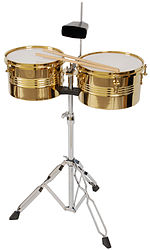
Back Кубински тимпани Bulgarian Timbales Breton Timbal (música llatina) Catalan Timbales German Timbaleo Esperanto Timbales (música latina) Spanish Timbaalit Finnish Timbales (cubaines) French Timbal Galician טימבלס HE
 Timbales with a single cowbell | |
| Percussion instrument | |
|---|---|
| Other names | Timbaleta, pailas, pailas criollas |
| Classification | drum |
| Hornbostel–Sachs classification | percussion (membranophone) |
| Developed | c. 1900 in Cuba |
| Related instruments | |
| Timpani, bongo drum | |
Timbales (/tɪmˈbɑːliːz/) or pailas are shallow single-headed drums with metal casing. They are shallower than single-headed tom-toms and usually tuned much higher, especially for their size.[1] They were developed as an alternative to classical timpani in Cuba in the early 20th century and later spread across Latin America and the United States.
Timbales are struck with wooden sticks on the heads and shells, although bare hands are sometimes used. The player (called a timbalero) uses a variety of stick strokes, rim shots, and rolls to produce a wide range of percussive expression during solos and at transitional sections of music, and usually plays the shells (or auxiliary percussion such as a cowbell or cymbal) to keep time in other parts of the song. The shells and the typical pattern played on them are referred to as cáscara. Common stroke patterns include abanico, baqueteo (from danzón), mambo, and chachachá.
Timbales have average diameters of 33 cm (13 in) (macho drum) and 35 cm (14 in) (hembra drum).[2] Originally made of calfskin, the heads are most commonly made of plastic for increased volume and durability and mounted on a steel rim.[2] The shells are usually made of metal, although wooden shells are also available. In general, the drums are mounted on a stand and played while standing. Smaller timbales called timbalitos are often incorporated into larger drum kits.
- ^ Orovio, Helio 1981. Diccionario de la música cubana: biográfico y técnico. Entries for Paila criolla; Timbal criollo.
- ^ a b Wacker, Jonathan (2003). "Timbales". In Shepherd, John (ed.). Continuum Encyclopedia of Popular Music of the World: Volume II: Performance and Production. London, UK: Bloomsbury. pp. 401–402. ISBN 9780826463227.
© MMXXIII Rich X Search. We shall prevail. All rights reserved. Rich X Search